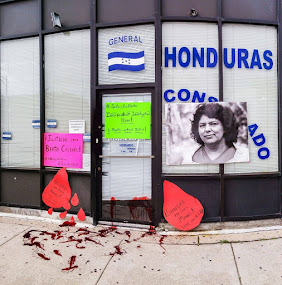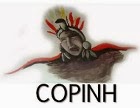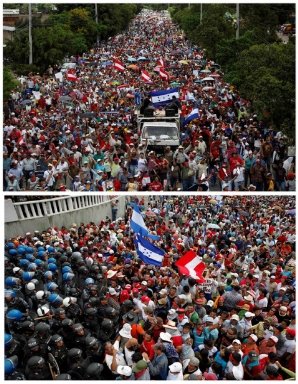 Report from Day 3 of La Voz de los de Abajo Human Rights delegation to Honduras
Report from Day 3 of La Voz de los de Abajo Human Rights delegation to Honduras Snapshots of Struggle 10/26/09
Under the congress
The Honduran congress rests on tall columns to protect it from riots. Before the coup, the indigenous and peasant movements would do mobilizations outside of the congress and spend the night camped out underneath it. Now the army maintains a constant presence preventing anybody from coming near. But the resistance continues to challenge them.
 This Monday October 26th the resistance decided to mobilize outside of the congress. The Honduran resistance hasn't missed a single day in the streets in the over 120 days that have passed since President Manuel Zelaya was forcibly removed from power by U.S.-trained military generals on June 28th of this year. Our delegation arrived early and scoped out a place to flee to in the case the tear gas that has bathed so many other resistance protests began to fly. An older man sitting on a bench advises us to go across the bridge to the crowded marketplace in the area of the city known as Comayaguela, saying “the army is less likely to chase people there because they know all the people support us.”
This Monday October 26th the resistance decided to mobilize outside of the congress. The Honduran resistance hasn't missed a single day in the streets in the over 120 days that have passed since President Manuel Zelaya was forcibly removed from power by U.S.-trained military generals on June 28th of this year. Our delegation arrived early and scoped out a place to flee to in the case the tear gas that has bathed so many other resistance protests began to fly. An older man sitting on a bench advises us to go across the bridge to the crowded marketplace in the area of the city known as Comayaguela, saying “the army is less likely to chase people there because they know all the people support us.”
 Buying time until the mobilization starts, we walk over to the central plaza. Several high school students walking by are talking with pride about the resistance, “they're over there by the congress!” says one to another. A security guard at a nearby pharmacy, upon learning we are here to bear witness and document in the case of human rights violations says, “good, because those those police seem to love to beat the crap out of people. The police and the army. You'll see.” Luckily on this day we didn't. But what we did bear witness to was an energy and spirit of struggle that continues unabated despite over 120 days of brutal repression, killings, beatings and jailing.
Buying time until the mobilization starts, we walk over to the central plaza. Several high school students walking by are talking with pride about the resistance, “they're over there by the congress!” says one to another. A security guard at a nearby pharmacy, upon learning we are here to bear witness and document in the case of human rights violations says, “good, because those those police seem to love to beat the crap out of people. The police and the army. You'll see.” Luckily on this day we didn't. But what we did bear witness to was an energy and spirit of struggle that continues unabated despite over 120 days of brutal repression, killings, beatings and jailing.
The grandmothers of the resistance lead people in chants celebrating the struggle to restore democracy and re-found the country through a constitutional assembly. It would be easy for an outside observer to get the impression based on the energy and animation of the protesters that this was a mobilization that had been built up to and rested before, rather than just another day of an every day struggle in Honduras that the coup-plotters have been unable to quiet.
Meeting with Juan Barahon, General Coordinator of National Resistance Front
The international press often tries to paint a picture of the political crisis in Honduras as a battle between two men or between political parties. Rarely do they mention that grassroots union leaders from the resistance like Juan Barahona who are in the streets every single day confronting the army and the police sit at the negotiating table over the resolution of the political crisis. Rarely do they mention the true backdrop of the coup d'etat, the fact that President Zelaya had opened up the doors of the Presidential palace to advisors from grassroots movements in the labor, indigenous, peasant and other sectors.
Juan Barahona met with us in a room at the Union of Beverage Workers (STIBYS) headquarters covered in posters from struggles around the world. He explained the roots of the political crisis in Honduras in detail as well as the current challenges before the Honduran resistance.
 “The oligarchy miscalculated with this coup d'etat. They thought that there would be a couple days, at most a week of resistance and that they would consolidate their power quickly and put the breaks on the Honduran and Latin American social movement. Neither they nor we knew that the Honduran people would rise up like they have, that we would see hundreds of thousands in the streets,” Barahona explained.
“The oligarchy miscalculated with this coup d'etat. They thought that there would be a couple days, at most a week of resistance and that they would consolidate their power quickly and put the breaks on the Honduran and Latin American social movement. Neither they nor we knew that the Honduran people would rise up like they have, that we would see hundreds of thousands in the streets,” Barahona explained.
“Some of the protests in the streets of Tegucigalpa have had as many as 400,000 people in a city that only has 800,000 residents. The resistance has been profound.” But he also made clear that while there was a great degree of spontaneous outpouring of support, the resistance didn't emerge out of nothing. For years before Zelaya even came to power, the indigenous movement, the peasant movement, the union movement, the feminist movement, the Afro-descendent movement and many other sectors of Honduran society had began to articulate a common agenda in opposition to neoliberal economic policies that were privatizing everything and making life harder by the day for the majority of poor Hondurans. They had formed a National Coordinator of Popular Resistance and took over all four major highways entering the capital city, putting forth a 12 point plan to shift the direction of the country politically, socially and economically.
When Zelaya began to clash with the 10 families who hold most of the wealth in Honduras, the social movements sat down with him to negotiate the 12 points, only to discover that most of them would require a constitutional change in order to come to fruition. It was from these dialogues that the social movement decided to prioritize the demand for a new constitution and it was that demand above all that caused the Honduran oligarchy to decide enough was enough and that it was time to carry out a military coup to protect their interests.
Meeting with Carlos H. Reyes, Independent Political Candidate
 After the meeting with Barahona, we headed to the house of Carlos Reyes, the well-known union leader. independent presidential candidate who would run for the resistance if democracy were to be restored in Honduras. Carlos contextualized the coup within the trajectory of Honduran history, from colonialism, through independence and to the present day. He made clear that the 1982 constitution was created by the military and the U.S. Embassy and established the fundamental base for the ongoing preservation of power by the Honduran oligarchy. He explained how Zelaya gradually came to question the policies that the business and political elite told him needed to be implemented, especially privatization. When he realized, for example, that fully privatizing electricity would reduce the state share of revenues by about 20 cents of every dollar, he put a stop to it.
After the meeting with Barahona, we headed to the house of Carlos Reyes, the well-known union leader. independent presidential candidate who would run for the resistance if democracy were to be restored in Honduras. Carlos contextualized the coup within the trajectory of Honduran history, from colonialism, through independence and to the present day. He made clear that the 1982 constitution was created by the military and the U.S. Embassy and established the fundamental base for the ongoing preservation of power by the Honduran oligarchy. He explained how Zelaya gradually came to question the policies that the business and political elite told him needed to be implemented, especially privatization. When he realized, for example, that fully privatizing electricity would reduce the state share of revenues by about 20 cents of every dollar, he put a stop to it.
“Zelaya is no revolutionary. The changes he was making were just scratching the surface of what our country needs. But we can see there how the Honduran oligarchy reacts when you touch their interests at all, even if just with the edge of the petal of a rose. They carry out a coup. This coup is dangerous not just because it has set back Honduran democracy and because of the abuses being committed daily, but because the ultra-right is trying to make an example out of Honduras and put the breaks on the emancipatory project of our entire continent. Since Zelaya returned to the country, the resistance has increased, the repression has increased, but the coup-makers are in their place still... We have a great challenge before us but a steadfast will.”












No comments:
Post a Comment